 |
 |
 |
 |
 |
 |
|
|
| Home | Events | Donations | GuestBook | Email Login |
|
|
 State Theatre - Ithaca, NY |
|
Bragg managed to grab some studio time, courtesy of the Charisma label's indie subsidiary, Utility. The result was 1984's Life's a Riot with Spy Vs. Spy, which hit the UK Top 30. It was an early indicator that Bragg's work would be infused with genuine insight and humor, as well as a sustained and personal commitment to political and humanitarian issues. |
|
Bragg, however, entered the Nineties with his most political work to date. The Internationale mini-album, released in May 1990, included such tracks as The Marching Song of the Covert Battalions, Nicaragua Nicaraguita and Bragg's very personal rendition of the William Blake poem, Jerusalem as well as the Socialist anthems, The Red Flag and the title track, The Internationale. |
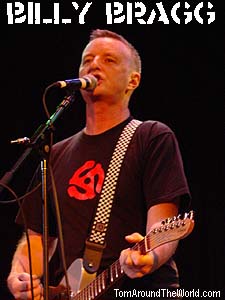 |
| "Although he had come out of a punk rock background, he could sing along with the country and western singers, the folkies and just about everyone else who appeared in the show," says Nora Guthrie. "When he accompanied the rappers Disposable Heroes of Hiphoprisy on Vigilante Man, we were blown away. He seemed open to anything and everything. His wry sense of humor, reminiscent of Woody's, also caught our attention immediately". Nora Guthrie decided that Bragg was the perfect candidate to set new music to the unrecorded Woody Guthrie lyrics. There was no record of any music being written, thus Bragg was given the task of 'reinventing' original Woody Guthrie songs. The lyrics - about New York City streets, film star idols, drinking, loving, dying and even spaceships - were specifically chosen because they presented a completely different aspect to Woody Guthrie's public persona. Bragg's role was to provide the musical platform for a previously 'unexplored' Guthrie. Bragg's collaborators on the project were American alt-country rockers, Wilco. The result was Mermaid Avenue, released in 1998. Recordings began in Wilco's hometown of Chicago and then in Dublin, where English fiddler Eliza Carthy and blues man Corey Harris made their contributions. Natalie Merchant also added her talents when Bragg was finishing the recordings in Boston. So much material was recorded during those sessions that Mermaid Avenue Volume II was issued two years later, in 2000. Both albums were nominated for Grammy Awards. A rift with Wilco over mixing and sequencing of the album led to Bragg recruiting his own band, The Blokes, to promote the album. The tour worked so well it was inevitable that The Blokes would be a permanent band, playing with Bragg in the U.S. and the rest of Europe. |
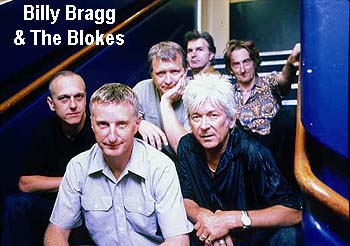 |
Billy Bragg's current touring and recording band, The Blokes, feature the great talents of Ian McLagan, who plays Hammond Organ and Piano. In a previous life he has played with The Small Faces, The Faces, Bob Dylan, The Rolling Stones and nearly every other musical legend you can think of. The other musicians in The Blokes were Ben Mandelson (lap steel guitar); Lu Edmonds (electric guitar and vocals) who has played with The Damned, Pil, The Mekons, and Shriekback; Drummer Martyn Barker who also played with Shriekback; and Simon Edwards (bass) who played with Fairground Attraction, Talk Talk, Kirsty McColl and Shriekback. |
|
Since beginning his crusade for reform of the House of Lords, Bragg was invited to present his ideas to the Lord Chancellor, Lord Falconer, to promote the idea of proportional representation in the House and to drive up the numbers of people voting in an attempt to combat voter apathy. |
|
The themes that pervade England, Half English have been further amplified in The Progressive Patriot: A Search For Belonging, Bragg's first book, published by Bantam Press on Monday 9 October, the same day Billy Bragg Volume 2 is released. The Progressive Patriot is part autobiography and part polemic on the meaning of national identity in modern Britain. |
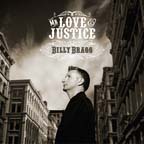 |
| When sound check was finished and all was
set, Billy introduced us to Grant, his manager and told us not to be afraid
of "our Aunty Granty." Grant then led the group of people, including
eight people from the Slope Media department
of Cornell University, down to a small room in the bowels of the
old theatre. In the hallway, Dawn and I prepared our cameras, both still and video, for the interview. Unfortunately, the video camera battery had died and it was of no use. Five minutes later, Grant had us follow him to a different room where we would be doing interviews. With about 10 of us shoved into a back-corner dressing room underneath the stage, Billy got a little rowdy when his road manager continued to pester him about getting dinner before the show. In the background we could hear The Watson Twins going through their sound check. Being a veteran interviewer, I was ready to begin and the Slope Media crew was still setting up their equipment. So, Billy and I decided to begin and the Slope Media crew would just join in when they were ready. |
|
Billy Bragg Interview - October 18th 2008 Tom: Its been nearly 25 years since your début and many think of you as a solo artist, and you have been referred to as "the one man Clash", but for your last release you teamed up with The Blokes, how did that come about? |
| Billy: Here comes my cup of tea. Thank you very much. We'll be fine. Dinner will be in a minute… Don't worry. I'll eat. He's like my mum, ya know what I'm saying… And so consequently, Nora was very, very generous. She allowed me and the guys to, more or less, instead of actually doing past ages Woody, to actually take the little guy and run with it, and take him forward. Tom: Since your last album, you have been working on some other projects including the Jail Guitar Doors With Mick Jones of The Clash. Tell the viewers what that's about and how that's going. Billy: Well, basically, this guy who was doing rehabilitation work in a British prison lived about an hour away from where I am. He got in touch with me to say he was doing really great work with the inmates; unfortunately, he only had one guitar, and could I help him get some more guitars. So, I sorted him out about a half a dozen acoustic guitars. And it seemed to me they would be other people working within the system who were doing this work. If we can find those people, and supply them with instruments, we might be able to make a contribution towards rehabilitation. Like the American system, our prisons are overcrowded and understaffed. And as a consequence it's very difficult to actually change rehabilitation, which strangely enough, our system tries to make happen rather than retribution. As a consequence of this, I've since become with people like Mick and other musicians. It's become very, very fruitful in to about 18 or 19 prisons in the last year and a half. Tom: You've even got some people from the States involved in this now. Billy: I have, I have. Not just activists In Washington DC and in Kansas. Chris (Shiflett) from Foo Fighters was recently in touch. He's come to England with his band Jackson United and he is interested in doing some stuff as well. So the word is spreading, and it is an eminently global idea. Tom: Have you guys seen a good response to it in England? Billy: Well, in some prisons, the work is done by volunteers. In some prisons, the best ones, the work is done by the prisoners themselves. And they write to me and tell me the connection they get with the men is stronger than ever before. One of them wrote and said, 'I've never had this thrill in eighteen years of working in the prison system.' So I'm assuming its helping to bridge that gap. |
|
Tom: Besides making music, you've also written books and political pamphlets. What is that like, and how is the creative process different than song writing? |
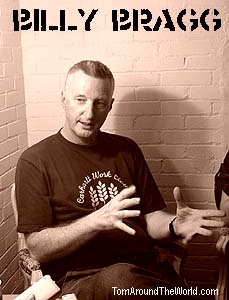 |
| Slope Media: What is the importance of keeping that style? You know, the one man with a guitar... Billy: Well, it's very important to me. I think one of the problems about playing with a band is that everyone plays for the band, And so you just become a bit run-of-the-mill. But the power that you can get… The way you get people's attention onto one idea because your one person performing is very powerful. I'm not saying I prefer one or the other, because I like touring with The Blokes, but it does allow me to move the set around every night as I'm playing it, which is nice to have. Slope Media: And, does that sort of bring a focus on your words more as a poetry concept? Billy: Well, certainly in the fact that I'm not a very good guitar player. Yeah, I'm not that good. My son has just learned to play guitar. I taught him how to play the chords to "Another Girl, Another Planet" by The Only Ones. After he had mastered that, he said, 'OK, now show me how to (imitates guitar sound).' And I said, 'Your dad is not that kind of guitar player.' And he said, 'What do you mean? You play the guitar.' I said, 'Yeah, I can. But I am a rhythm player. I'm like Johnny Ramone. I just play rhythm' He's into the Ramones… 'You never hear him play lead guitar, do ya?' And he said, 'No, you're right. All right, Dad.' He suddenly realized the limitations of his rock star dad. Slope Media: This year you wrote an op-ed for the New York Times. Billy: I did. Slope Media: And from what I read of your information, it's about regulation of organizations bringing music through the Internet to young people. What do you think about the MySpace Generation? Billy: I think MySpace, in general, has great potential for the young artists to be able to get their music and their art out there without having to go through the traditional gatekeepers, and without having to compromise what they want to do in order to appeal to some A&R man's idea of mass marketing. But, having said that, the protections for unsigned bands and artists out there are very, very slim. And my problem with MySpace was around the idea of ownership of the material posted. Their terms and conditions implied that they own residual rights to the stuff that was posted on there. What I said was… I was taking my music off until this was clarified or changed. They responded by saying that they have Madonna on MySpace and they clearly don't own her stuff. To which I responded, 'Yes, but she's got a lawyer and a publishing deal.' The majority of people don't have those things. The only deal they've ever entered into his I clicked on those conditions. Now I don't want a situation where every kid has to sit there with an attorney before they can get something posted on the net. In the spirit of the Internet, people should understand that they can use the platforms to disseminate their art without being afraid that they're going to lose their rights, so MySpace did ultimately change. They didn't really change their terms, but they clarified it. They put at the beginning, at the first sentence, a clear statement saying that you own whatever you post. The ownership resides with you. That's really, really important. There is another clause in there that says…when you…uh… |
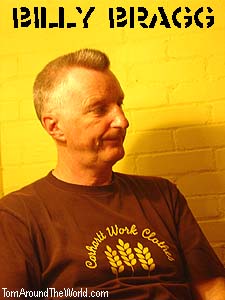 |
Billy's manager comes to the door of the room and sticks his hand through the transom at the top and waves it around, signaling to Billy that he wants to go eat. |
|
Tom: Then, you have people like Attila The Stockbroker, who are going against the record company and posting stuff on MySpace anyway, free to download. Its kind of a big (gives the Finger) you to the record company. |
|
Once again, the manager comes to the door and knocks. |
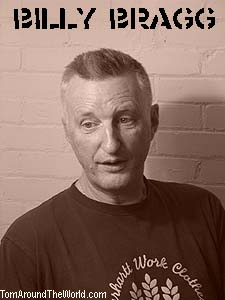 |
| With that, Grant led up back upstairs and we were free to do what we wanted until the show began. Dawn and I were starving so we walked around the Ithaca Commons, found a nice Chinese restaurant and had dinner. The food was great. We both had shrimp and broccoli and a Coke. After dinner we walked back to the State Theatre just in time to take our seats for the show. |
 |
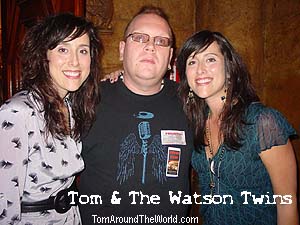 |
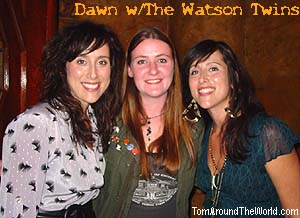 |
| Soon, the lights flashed signalling that it was time to reyurn to our seats. Dawn and I returned to the interior of the theatre and I headed up to the press pit to shoot photos. Billy Bragg took the stark stage and began his set with his classic song "Help Save The Youth Of America" as I snapped away. The song is my personal favorite tune by Billy. After the first three songs, I headed back to my seat. Dawn's camera has a video feature, so I shot a few songs. The quality of the videos is low, but I worked up a video to post here. It is the classic Billy Bragg song "Give My regards To The New Brunette." I made it look really old and it seemed to look okay that way, but the sound quality is pretty good and worth watching. here is the complete set list for the show: Help Save - To Have - Farm Boy - Greetings - Ingrid - Way Over - Got No Home - NPWA - Sexuality - Save The Country - O Freedom - J. Clash - Faith - Power Billy left the stage to thunderous applause and a standing ovation. The crowd continued to clapp and cheer until he returned to the stage for an encore. For the final songs he performed Levi Stubb's Tears, Sing, and New England. He received another standing ovation as he thanked the crowd and left the stage, this time for good. With the show over, Dawn and I gathered up our coats and gear and walked back to the car. The drive back to Syracuse was clear. Dawn and I talked about the show all the way home and agreed that this show will forever stand out in both of our minds as one of the greatest days of both of our lives. |
|
|
| Home | Events | Donations | GuestBook | Email Login |
|
|
 |
 |